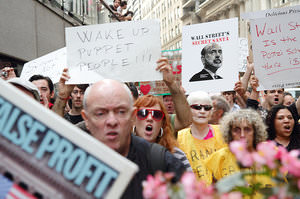Foggy Demands May Hurt Wall St. ‘Occupation’
Going into their third week on the streets, the protesters who make up Occupy Wall Street are gaining more and more attention from mainstream media. But with the new scrutiny rises an issue that the Los Angeles Times and The New York Times each touched on in features published this week: Protesters lack narrow, unifying demands.
Going into their third week on the streets, the protesters who make up Occupy Wall Street are gaining more and more attention from mainstream media. But with the new scrutiny rises an issue that the Los Angeles Times and The New York Times each touched on in features published this week: Protesters lack narrow, unifying demands.
Twice-a-day marches and hundreds of handmade signs are evidence that, while the protesters have seemingly boundless energy and enthusiasm, they also seem to be championing countless causes.
“Wake up!” some signs say, and “We are the 99 percent!” But also: “Justice for Troy Davis,” “Feed the poor!” and “Wall Street is killing our air, our soil.”
Some say the protesters’ lack of direction and tangible goals could be the one thing that keeps the still relatively small movement from becoming one that could actually galvanize change. –BF
Your support matters…Los Angeles Times:
On its website, Occupy Wall Street describes itself as a “leaderless resistance movement” drawn from people of all backgrounds and political persuasions.
“The one thing we all have in common is that we are the 99 percent that will no longer tolerate the greed and corruption of the 1 percent,” the website says. The posters in Zuccotti Park speak to the lack of a narrow platform: “End financial aid to Israel”; “End greed, end poverty, end war”; “No death penalty”; “Tired of racism.”
Some supporters of the premise wonder how far Occupy Wall Street can go in galvanizing others if it does not translate its anger into specific demands.
“I see something beautiful here. I’ve never had a more interesting political debate,” said Carne Ross, a former British diplomat who resigned in protest over the invasion of Iraq, and who now owns a consulting business in New York. But Ross, who stops by regularly to advise Occupy Wall Street, said it needs “far broader outreach” and a narrower message.
Independent journalism is under threat and overshadowed by heavily funded mainstream media.
You can help level the playing field. Become a member.
Your tax-deductible contribution keeps us digging beneath the headlines to give you thought-provoking, investigative reporting and analysis that unearths what's really happening- without compromise.
Give today to support our courageous, independent journalists.

You need to be a supporter to comment.
There are currently no responses to this article.
Be the first to respond.